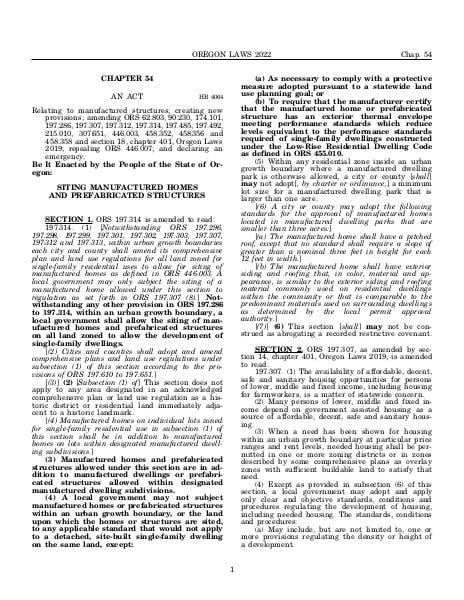

Relating to manufactured structures; creating new provisions; amending ORS 62.803, 90.230, 174.101, 197.286, 197.307, 197.312, 197.314, 197.485, 197.492, 215.010, 307.651, 446.003, 458.352, 458.356 and 458.358 and section 18, chapter 401, Oregon Laws 2019; repealing ORS 446.007; and declaring an emergency.
If a tenancy is for the occupancy of a recreational vehicle in a manufactured dwelling park, mobile home park or recreational vehicle park, all as defined in ORS 197.492 (Definitions for ORS 197.492 and 197.493), the landlord shall provide a written rental agreement for a month-to-month, week-to-week or fixed-term tenancy. The rental agreement must state:
If applicable, that the tenancy may be terminated by the landlord under ORS 90.427 (Termination of tenancy without tenant cause) without cause upon 30 or 60 days’ written notice for a month-to-month tenancy or upon 10 days’ written notice for a week-to-week tenancy.
That any accessory building or structure paid for or provided by the tenant belongs to the tenant and is subject to a demand by the landlord that the tenant remove the building or structure upon termination of the tenancy.
That the tenancy is subject to the requirements of ORS 197.493 (Placement and occupancy of recreational vehicle) (1) for exemption from placement and occupancy restrictions.
If a tenant described in subsection (1) of this section moves following termination of the tenancy by the landlord under ORS 90.427 (Termination of tenancy without tenant cause), and the landlord failed to provide the required written rental agreement before the beginning of the tenancy, the tenant may recover the tenant’s actual damages or twice the periodic rent, whichever is greater.
If the occupancy fails at any time to comply with the requirements of ORS 197.493 (Placement and occupancy of recreational vehicle) (1) for exemption from placement and occupancy restrictions, and a state agency or local government requires the tenant to move as a result of the noncompliance, the tenant may recover the tenant’s actual damages or twice the periodic rent, whichever is greater. This subsection does not apply if the noncompliance was caused by the tenant.